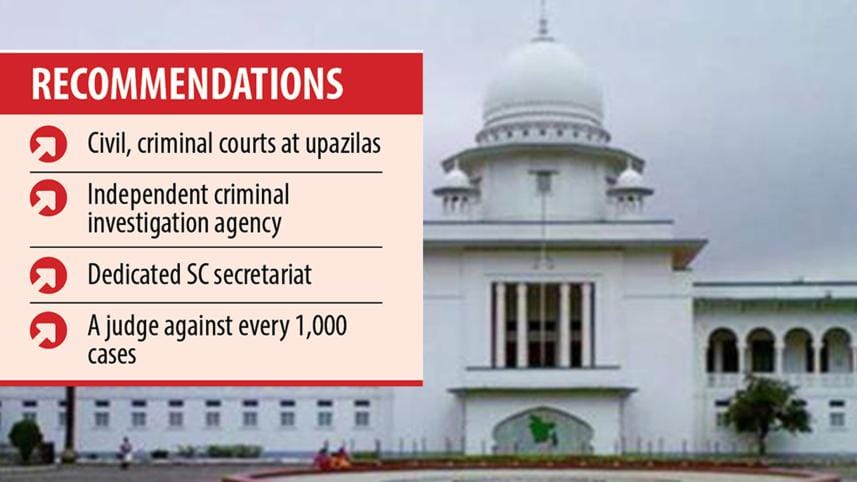Judiciary reform: HC benches in all divisional cities recommended

The Judiciary Reform Commission recommends decentralisation and expansion of the judiciary by establishing permanent High Court benches at every divisional city and civil and criminal courts at upazilas.
HC benches at divisions will shrink the pile of pending cases and help people get justice without much delay.
Since the 55 HC benches are all housed at the Supreme Court buildings in the capital, people who file litigations have to travel to Dhaka to attend the hearings. The HC currently has 5.77 lakh pending cases.
The reform commission also recommends adding a provision to the constitution for the appointment of the most senior judge of the Appellate Division as the chief justice. This will reduce the president's discretion in the matter.
According to a summary report of the recommendations, a nine-member commission led by the chief justice should be formed for the appointment of properly qualified individuals as Supreme Court judges. The nine-member body will ensure the minimum number of Appellate Division judges at seven.
The minimum age to be an apex court judge should be 48, and Article 96 of the constitution needs amendment to set the retirement age of judges at 70, up from the current 67 years.
The reform commission also suggests forming a Supreme Judicial Council (SJC) to ensure discipline and accountability among the SC judges; establishing an SC secretariat for full independence and separation of the judiciary; forming a permanent and independent attorney service for appointing prosecutors without political influence; establishing an independent criminal investigation agency in order to ensure the proper investigation process in the judicial system.
The recommendations include appointing honest, efficient and resourceful retired district judges for two to three years for quick disposal of cases in the districts where a large number of criminal appeals, criminal revisions, civil appeals and civil revisions are pending.
Considering the large number of cases under trial and the increasing population, jobs should be created for judges and support staff so that there is one judge against 800 to 1,000 cases.
To ensure transparency, the wealth statements of the apex court and lower court judges should be submitted to the SC every three years and uploaded on court websites.
Similarly, the wealth statements of the supporting officials should be available on the internet.
There must be complaint boxes at the SC and email IDs where people can put down their concerns or grievances, complaints of corruption. The SJC will look at the complaints.
Three SC judges should be in a primary investigation committee to probe the allegations of corruption against lower court judges. Based on the merit of a complaint, the committee will instruct the aggrieved whether to file a departmental case.
The Judiciary Reform Commission sent a copy of its summary report to Adviser Syeda Rizwana Hasan, who is coordinating all the reform commissions.
The judiciary commission is likely to submit its final report by January 31, its member and senior SC lawyer Tanim Hussain Shawon told The Daily Star.
Around 15,000 people, including commoners, lawyers, judges and others gave their views on reforms to the commission so far, he added.
To establish permanent HC benches at the divisional cities, the constitution's Article 100 should be replaced with appropriate provisions.
Article 100 says, "The permanent seat of the Supreme Court shall be in the capital, but sessions of the High Court Division may be held at such other place or places as the Chief Justice may, with the approval of the President, from time to time appoint".
The proposed permanent HC benches will deal with cases from specified regions.
The chief justice may, on his own motion or on the application from a party, transfer a case from any bench to another appropriate bench.
Infrastructure, including accommodation for judges and support staff, must be built and necessary budget allocation must be ensured for smooth functioning of permanent benches.
The eight-member Judiciary Reform Commission was formed on October 3 last year with former Appellate Division judge Justice Shah Abu Nayeem Mominur Rahman as its chief.
Other members include retired HC judges Justice Emdadul Haque and Justice Farid Ahmed Shibli; former district and sessions judge and former registrar general of SC Syed Aminul Islam; former district and sessions judge Masdar Hossain; Dhaka University associate professor Kazi Mahfuzaul Haque Supan; and a student representative.




 For all latest news, follow The Daily Star's Google News channel.
For all latest news, follow The Daily Star's Google News channel.
Comments